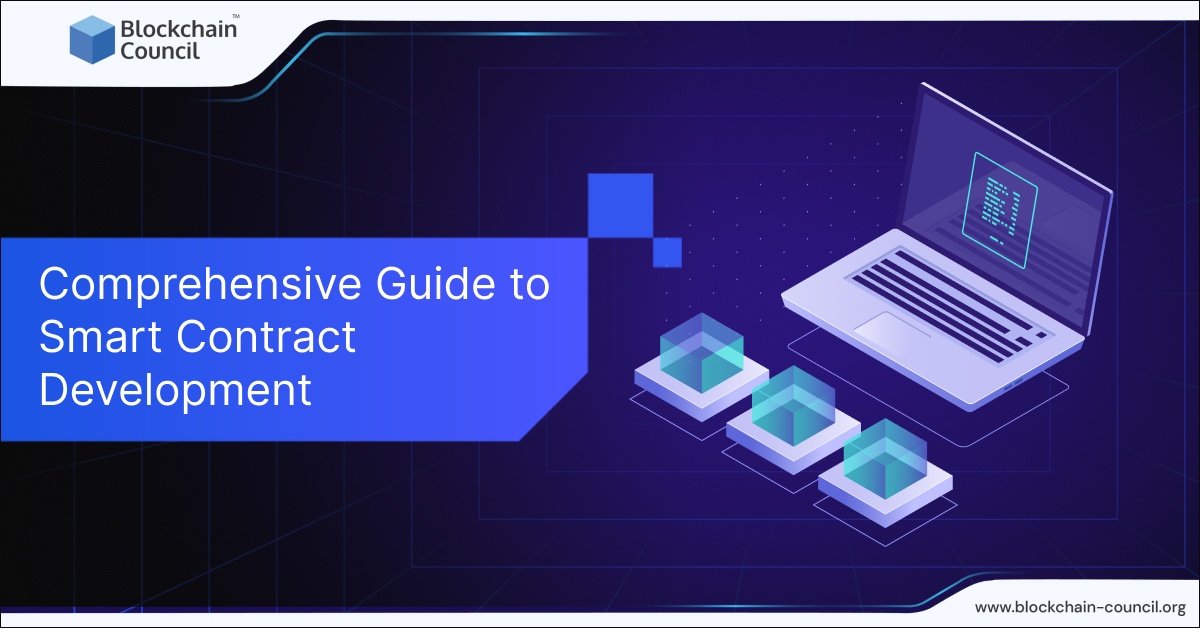Smart contracts have emerged as a game changer in the world of digital agreements, revolutionizing how we conduct online transactions. These digital marvels, which run on blockchain technology, eliminate the need for intermediaries, ensuring secure, transparent, and efficient exchanges. In this article, we'll look at the basics of smart contract development, its benefits and drawbacks, and why pursuing a smart contract developer course and certification is a wise career move.
Smart Contracts: What They Are and How They Work
Think of smart contracts as contracts that execute themselves based on predefined rules. These self-executing agreements are stored on blockchain networks, which are distributed databases protected by cryptography, making data modification nearly impossible.
When certain conditions are met, smart contracts automate actions. When buying a house, for example, a smart contract can transfer ownership and funds once both parties agree. This eliminates the need for lawyers or escrow services, which simplifies the process.
Advantages of Smart Contracts
Smart contracts have numerous advantages over traditional contracts:
They accelerate transactions by automating tasks and reducing human intervention and errors.
Transparency: The history and status of each transaction are visible and verifiable by anyone.
Security: To protect data from unauthorized access and tampering, smart contracts employ encryption and digital signatures.
Smart contracts make transactions more cost-effective by eliminating intermediaries and paperwork.
Smart Contracts' Essential Elements
Smart contracts are made up of several key components:
Digital Identities: For secure transactions, participants must have unique digital identities.
Conditions and Rules: Contract logic is encoded into smart contract code, defining the actions that should be taken.
Smart contract code and data are stored on blockchain networks to ensure immutability and transparency.
Smart contracts can handle digital tokens or assets, allowing for secure, frictionless transactions.
Smart Contract Development Programming Languages
Smart contract developers use a variety of programming languages, including:
Solidity: The most popular Ethereum smart contract language, known for its compatibility and community support.
Vyper: Inspired by Python, Vyper is designed for Ethereum smart contracts that are secure and auditable.
Tezos-specific liquidity, with an emphasis on safety and formal verification.
Scilla: For Zilliqa, with a focus on security and scalability.
Smart Contract Development Platforms
Smart contracts can run on various blockchain platforms, each with its own set of features:
Ethereum: A popular cryptocurrency with a diverse ecosystem and tools.
Binance Smart Chain: A scalability and cost-effective alternative to Ethereum.
Cardano is a cryptocurrency that prioritizes security, scalability, and sustainability.
Polkadot: Allows for interoperability between blockchain networks while also providing flexibility and scalability.
Considerations for Smart Contract Development in Terms of Security
The importance of security in smart contract development cannot be overstated. Take a look at the following:
Audit the code thoroughly to detect and fix vulnerabilities and bugs.
Best practices for secure development include robust input validation and defense against common attacks.
Penetration testing is used to identify and address potential vulnerabilities.
Third-party Libraries: When using third-party libraries, be cautious because they may introduce hidden security risks.
Updates on a regular basis: Keep your smart contract up to date with security patches and upgrades.
Smart Contract Applications
Smart contracts are used in a variety of industries, including:
Supply Chain Management is the process of tracking and verifying the movement of goods in order to reduce fraud.
Financial Services: Automating transactions, removing intermediaries in lending, insurance, and crowdfunding, among other things.
Real estate: reducing time and costs by simplifying property transactions.
Enabling secure patient data sharing among providers while maintaining privacy and interoperability.
Voting Systems: Developing transparent and tamper-proof voting systems in order to improve election integrity.
Smart Contract Development Obstacles
The development of smart contracts presents its own set of challenges:
Complexity can lead to coding errors and vulnerabilities that malicious actors can exploit.
Immutability: Once deployed, smart contracts are permanent and unchangeable, emphasizing the importance of accuracy and security.
Scalability: Scaling complex smart contracts on growing blockchain networks can be difficult.
Legal and regulatory compliance: Smart contracts must follow different legal and regulatory frameworks in different jurisdictions.
Future Smart Contract Development Trends
The field of smart contract development is always changing. Here are some new developments:
Interoperability: Smart contracts are increasingly capable of communicating across different blockchain networks, allowing them to expand their capabilities.
Techniques for enhancing smart contract privacy include developing and enabling confidential transactions while maintaining blockchain integrity.
Smart Contract Standards: Standardization will promote greater adoption and interoperability, making integration into digital infrastructure easier.
Integration with IoT and AI: Smart contracts are becoming more integrated with IoT devices and AI systems, expanding their potential applications.
The Importance of Certification for Smart Contract Development
Smart contract development is more than just a skill; it's a ticket to the future. With a growing demand for certified smart contract developers, enrolling in a smart contract developer course is your ticket to learning the intricacies of blockchain technology and smart contract development.
These courses provide in-depth knowledge of blockchain platforms and the tools required for the creation of secure and efficient smart contracts. Whether you're a seasoned developer or new to the field, a blockchain course tailored to smart contract development bridges the knowledge gap and provides you with the expertise you need to succeed.
A smart contract development certification validates your knowledge of designing, deploying, and maintaining smart contracts, which are at the heart of blockchain applications. Certified smart contract developers are in high demand across industries, from finance to healthcare and beyond, as businesses increasingly adopt blockchain technology.
Smart contracts will continue to shape the future towards efficiency and decentralization in this age of innovation. Don't pass up this chance to learn and earn your smart contract development certification and become a leader on this transformative journey. Your future in the world of smart contracts is waiting for you.
Consider exploring Blockchain Council's offerings as you begin your journey to becoming a certified smart contract developer. This authoritative group is made up of subject matter experts and enthusiasts who are championing blockchain development and research, investigating various use cases, and encouraging knowledge sharing for a brighter future.


No comments yet